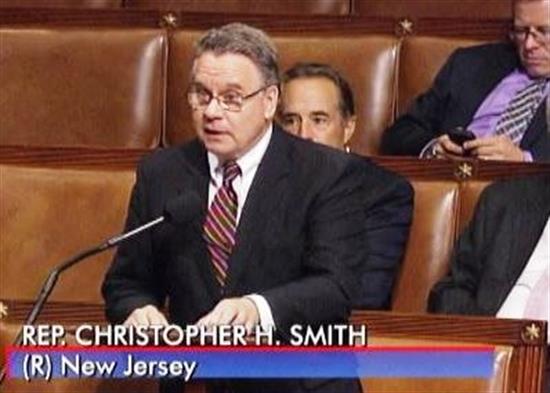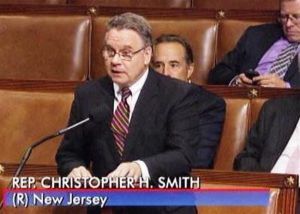 Bipartisan legislation to reauthorize and enhance federal programs for families touched by autism was debated and passed by the House of Representatives Tuesday night.
Bipartisan legislation to reauthorize and enhance federal programs for families touched by autism was debated and passed by the House of Representatives Tuesday night.
Authored by Rep. Chris Smith (NJ-04), the “Autism Collaboration, Accountability, Research, Education and Support Act of 2014—(Autism CARES Act),” HR 4631, authorizes $1.3 billion over five years for research into autism and urges federal agencies to examine and anticipate needs for autistic children who are “aging out” of current programs and need different assistance as adults.
“Previous autism law including the Combating Autism Act of 2011 made critical investments—continued by this bill—that are working to determine the causes of autism spectrum disorder (ASD), identify autistic children as early as possible to begin treatment, raise critical awareness and develop new therapies and effective services,” said Smith who, along with the bill’s Democrat cosponsor Rep. Mike Doyle (PA-14)), founded and co-chairs the bipartisan Coalition on Autism Research and Education (C.A.R.E.). “Mike Doyle has been a great partner on this bill and on all autism spectrum disorder issues in Congress.” (Click here to read Smith’s floor statement)
“We have made tremendous advances in understanding Autism Spectrum Disorders – but this progress will be lost if Congress allows these programs expire,” Congressman Doyle said today on the House Floor. “That is why it’s so important that Congress pass common-sense, bipartisan, bicameral legislation like the bill before us today. With the prevalence of Autism Spectrum Disorders much higher than we thought just a few years ago, inaction is simply not an option.”
The CDC’s most recent data shows a continued increase in autism prevalence rates: 1 in every 68 American children (1 in 42 boys and 1 in 189 girls). In New Jersey, 1 in every 45 children has ASD, the highest rate in the CDC study.
Smith told his colleagues on the floor that nearly 17 years ago, constituents Bobbie and Billy Gallagher of Brick, NJ and parents of two small children with autism, walked into his Ocean County district office looking for help. They believed their town had a disproportionate number of students with autism and wanted action, so Smith asked CDC and other federal agencies to visit Brick and investigate. They learned that prevalence rates were high not only in Brick but in nearby communities as well. Back in Washington, Smith introduced HR 274—the Autism Statistics, Surveillance, Research and Epidemiology (ASSURE) Act which was enacted as Title 1 of the Children Health Act of 2000.
“Billy and I are elated to have had Congressman Smith remain an adamant supporter and fighter for those with an autism spectrum disorder,” Bobbie said last night after passage. “His dedication throughout the years has been without comparison. The Combating Autism Reauthorization Act will continue to provide the necessary funding for research, epidemiology and other areas, but now it will also include research into better understanding the needs of the adult population. As parents of two children over the age of 21, we say BRAVO!! for this inclusion, and we hope that others will follow the lead that Congressman Smith has taken to helping those with Autism throughout their lifespan. As always, Congressman Smith remains one of our Heroes for the Autism Community.”
Smith also cited the remarks of a Hamilton, N.J. youth, Jonathan Kratchman, a 16-year-old with Asperger’s from New Jersey, who was the keynote speaker at a “Dare To Dream Conference” at Mercer County Community College last year, where he stated: “I know I can be a great contributor to society when I graduate. However, I need continuing support to get there… Here is a fast fact. If you take your high school diploma at age 18, you automatically lose services from your school district.”
“Both individuals with autism, like Jonathan, and their parents find themselves confronted with almost unimaginable challenges including loss of school instruction, housing and job needs,” Smith said. “We are in the midst of a huge yet largely invisible crisis that begs serious focus and remedies.”
Smith’s new legislation includes a report from the HHS secretary on best practices for transitioning adolescents, which will be enhanced by another report by the GAO that provides critical input from state and local governments, the private sector and non-profits working with kids with ASD. The reports will beef up the government’s commitment to help individuals with ASD making the transition from a school-based support system to adulthood by studying the demographics and needs and encouraging independent living, equal opportunity, full participation, and economic self-sufficiency. There are an estimated 50,000 young people on the autism spectrum matriculating to adulthood.
“We need to do a better job of preparing children with ASD for adulthood and provide the help and services they need to reach their full potential,” said Smith. “The Autism CARES Act tasks multiple federal agencies to study and report back to Congress on the special needs of autistic young adults and transitioning youth. In light of the severity of the aging out crisis, we must do more and fast and ensure we are providing a comprehensive and thorough review of available services—and those we need to create.
“The latest prevalence data from the Centers for Disease Control and Prevention (CDC) is shocking: 1 in every 68 American children are on the autism spectrum—a tenfold increase over the last 40 years,” Smith said. “Boys on the autism spectrum outnumber girls 5 to 1.”
The congressman said much progress has been made over the decades. Today, the evidence suggests that there is no single cause or type of autism. Genetic risk coupled with environmental factors including advanced parental age, low birth weight and prematurity among other factors may be triggers. Signs of autism in a child usually manifest between 12-18 months—some as early as 6 months—while some “regress” after 2.
“Particularly intriguing are the results of prenatal vitamin intake through supplements and diet, showing a 40 percent reduction in risk of ASD with prenatal vitamin supplements taken in the three months before or during the first month of pregnancy,” Smith said.
Smith’s bill has over 80 bipartisan cosponsors and support from Autism Speaks, the Autism Society, the Association of University Centers on Disabilities, and the American Academy of Pediatrics.
The legislation would authorize $1.3 billion for autism programs over five years in the following ways: $110 million for the Developmental Disabilities Surveillance and Research Program at the CDC; $240 million for Autism Education, Early Detection, and Intervention, and; $950 million for hundreds of Research Grants at the National Institutes of Health (NIH), and the Interagency Autism Coordinating Committee (IACC). It would also add key reforms to IACC to ensure coordination is maximized and the taxpayers’ dollars are spent efficiently, and increase accountability by requiring HHS to designate an individual charged with implementing IACC’s annual strategic plan and report to Congress how they are doing so.
###


